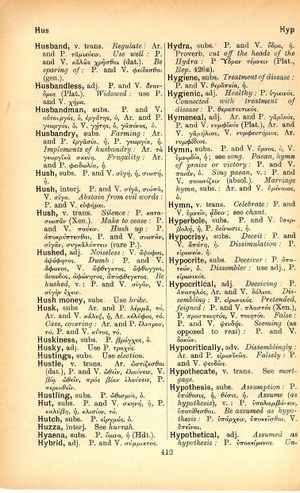hydra: Difference between revisions
Εὐνοῦχος ἄλλο θηρίον τῶν ἐν βίῳ → Eunuchus, alia vitam spurcans bestia → Ein weitres Lebensungetüm ist der Eunuch
(3_6) |
m (Text replacement - "}}]]" to "}}]]") |
||
| Line 1: | Line 1: | ||
{{Woodhouse1 | {{Woodhouse1 | ||
|Text=[[File:woodhouse_412.jpg|thumb | |Text=[[File:woodhouse_412.jpg|thumb | ||
|link={{filepath:woodhouse_412.jpg | |link={{filepath:woodhouse_412.jpg}}]]'''subs.''' | ||
P. and V. [[ὕδρα]], ἡ. | P. and V. [[ὕδρα]], ἡ. | ||
Proverb., <b class="b2">cut off the heads of the Hydra</b>: P. Ὕδραν τέμνειν (Plat., ''Rep.'' 426E). | Proverb., <b class="b2">cut off the heads of the Hydra</b>: P. Ὕδραν τέμνειν (Plat., ''Rep.'' 426E). | ||
Revision as of 10:08, 15 August 2017
English > Greek (Woodhouse)
subs.
P. and V. ὕδρα, ἡ. Proverb., cut off the heads of the Hydra: P. Ὕδραν τέμνειν (Plat., Rep. 426E).
Latin > French (Gaffiot 2016)
hydra,¹¹ æ, f. (ὕδρα), hydre de Lerne : Lucr. 5, 27 ; Virg. En. 6, 576 ; Ov. M. 9, 192 || le Serpentaire [constellation] : Cic. Arat. 34, 292.
Latin > German (Georges)
hydra, ae, f. (ὕδρα), I) eine Wasserschlange, als Ungeheuer der Mythe, wie die mit 50 Rachen in der Unterwelt bei Verg. Aen. 6, 576. – bes. aber hydra Lernaea u. bl. hydra, die vielköpfige Schlange im See Lerna (s. Lerna), der, als ihr Herkules die Köpfe abschlug, statt jedes abgeschlagenen Kopfes zwei andere wuchsen, worauf der Held sie dadurch tötete, daß er mit Hilfe seines Wagenlenkers Jolaus die Stellen, wo die Schlangenköpfe sich erneuerten, mit Holzbränden ausbrannte, Varro sat. Men. 299. Lucr. 5, 27. Hor. carm. 4, 4, 61: dah. videto, ne hydra sit tibi et pellis (d.i. das Geringere, Leichtere), Hercules autem (das Schwerere, Wichtigere) relinquatur, Cic. de or. 2, 71: Lernaeas pugnet ad hydras = unterzieht sich den größten Gefahren, Prop. 2, 24, 25. – II) nom. propr., Hydra, ae, f. A) die lernäische Schlange als Mutter des Zerberus, Cic. poët. Tusc. 2, 22. – B) die Wasserschlange, ein Gestirn, sonst Anguis gen., Cic. Arat. 292.

